Score Four Materials
Interstate Commission on the Potomac River Basin
Quick Links: Program Overview PDF* | Lessons | Bilingual Lessons | Resources
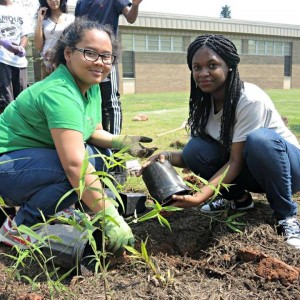 ICPRB’S Score Four: Students, Schools, Streams, and the Bay Program culminates with Student Stormwater Action Projects to reduce water pollution. But before students turn one shovel of dirt, they conduct a series of investigations of their school’s watershed and campus. Students assess permeability, stormwater dynamics, pollution sources, and soils. Using their findings, they plan and implement a Student Stormwater Action Project. Projects can be conservation landscapes, rain barrels, tree plantings, rain gardens, and more. Best for grades 9-12; can be adapted for middle school.
ICPRB’S Score Four: Students, Schools, Streams, and the Bay Program culminates with Student Stormwater Action Projects to reduce water pollution. But before students turn one shovel of dirt, they conduct a series of investigations of their school’s watershed and campus. Students assess permeability, stormwater dynamics, pollution sources, and soils. Using their findings, they plan and implement a Student Stormwater Action Project. Projects can be conservation landscapes, rain barrels, tree plantings, rain gardens, and more. Best for grades 9-12; can be adapted for middle school.
| Use this Score Four Lesson Framework to see how the program aligns with the Meaningful Watershed Educational Experience (MWEE) and Maryland Environmental Literacy. | See the Score Four Program overview*. |
Score Four Lesson Plans
We recommend using lessons from each of the following categories sequentially. Most lessons involve a presentation and student inquiry or activity. For more information, refer to the Score Four Lesson Framework.
The inquiries can be downloaded individually or as complete sets:
Complete Student Notebook | Combined Teacher and Student Notebook
*PDF Presentations marked with an asterisk (*) have a companion PowerPoint presentation. Please Contact us for the file.
A. Exploring Your Watershed
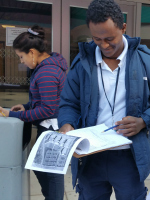 Students learn about their local waters, pollution sources, and solutions for stormwater pollution.
Students learn about their local waters, pollution sources, and solutions for stormwater pollution.
- Background Presentation: Watersheds, Land Use, and Sustainable Practices (PDF Presentation*)
- FieldScope Map Inquiry (PDF Presentation*, Teacher | Student Handout)
- Exploring with Maryland Maps (PDF Presentation*)
- Topography, Land-use, and Stormwater Chemistry
- Teacher | Collecting Stormwater Samples
- Stormwater Chemistry: Student Worksheet
- Topography (Grades 11-12): Student Worksheet
B. Assessing Your Campus
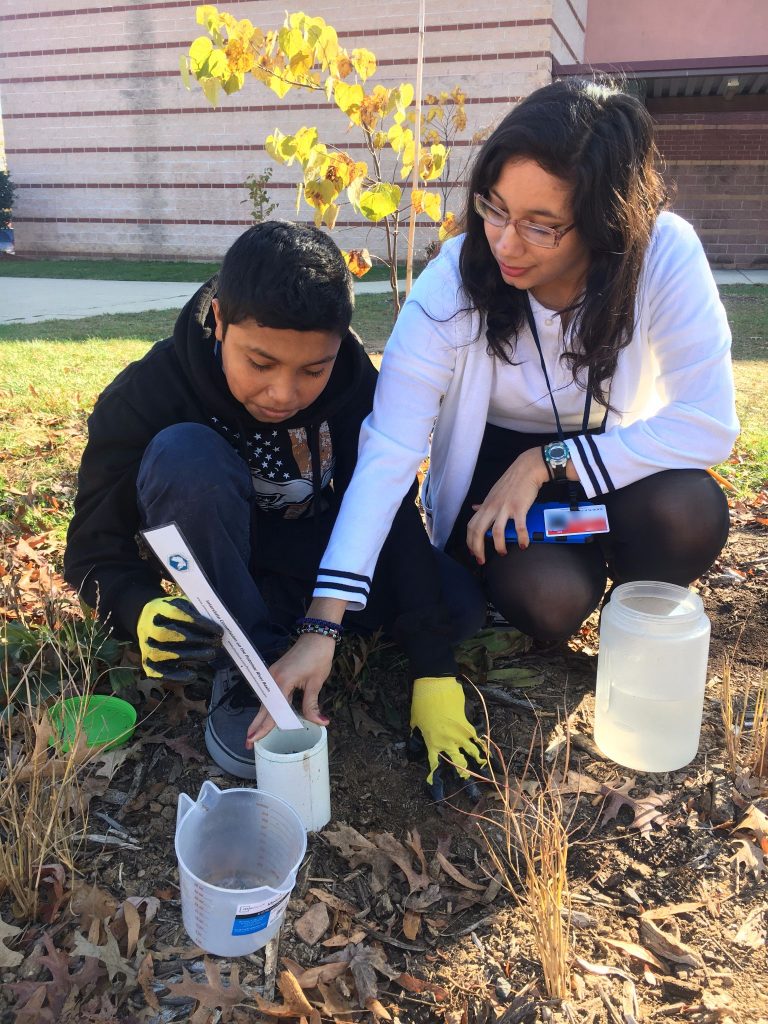 Students discover how their school campus contributes to stormwater pollution.
Students discover how their school campus contributes to stormwater pollution.
- Permeability Prediction, Grades 6-8 (Teacher | Student Handout)
- Permeability Field Investigation (Teacher | Student Handout)
- Campus Assessment (Presentation PDF Presentation*, Teacher | Student Handout)
- Soil Lessons and Inquiries
- Soil Basics Presentation (Middle School PDF Presentation* | High School PDF Presentation)
- Soil Components – It’s Not Just Dirt!, Grades 5-12 (Teacher | Student Handout | PDF Presentation*)
- Soils Percolation Investigation (Teacher | Student Handout)
- 3 Soil Inquiries for Special Education, grades 9-12 (Teacher)
- Soil Presentation (with teacher notes) for Special Education, grades 9-12 (PDF Presentation*)
C. Planning Your Project
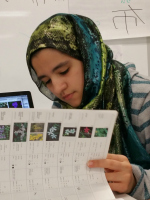 Students investigate factors that affect the growth of plants and trees; set goals for their Stormwater Action Project; pick their site; design a project; and start planting.
Students investigate factors that affect the growth of plants and trees; set goals for their Stormwater Action Project; pick their site; design a project; and start planting.
- Planning Your Project (Teacher)
- Conservation Landscapes and Goals (Presentation: PDF Presentation*)
- Picking the Project Goals (Student Handout)
- Site Selection (Student Handout)
- Sun/Shade Observation (Student Handout)
- Site Conditions and Project Characteristics (Student Handout)
- Plant Selection and Garden Design
- Native Plants and Plant Selection (Presentation: (PDF Presentation*)
- Garden Design (Presentation: PDF Presentation with notes*)
- Plant Selection and Garden Design (Student Handout)
- Planning Color for the Seasons (Student Handout)
- Installing Your Conservation Landscape (Presentation: PDF Presentation*)
D. Maintaining Your Project
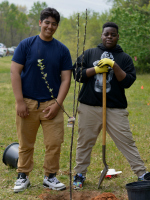 Students plan and create a maintenance schedule to ensure the project continues to meet the class goals for years to come.
Students plan and create a maintenance schedule to ensure the project continues to meet the class goals for years to come.
- Conservation Landscape Maintenance (Presentation: PDF Presentation*)
- Maintaining Your Project (Student)
- Maintenance Agreement for Schools with signature page (Teacher)
Resources
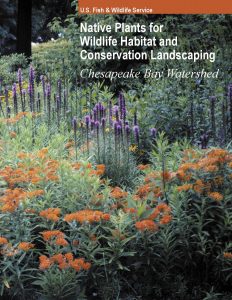
- Stormwater Action Project Resources
- Environmental Resource Directory
- Native Plants for Wildlife Habitat and Conservation Landscaping: PDF | Website
The Score Four Program is a partnership of the Interstate Commission on the Potomac River Basin (ICPRB) and the Elms Environmental Education Center. Significant contribution of lessons and presentations by:
Rebecca Wolf, Watershed Coordinator at ICPRB
Nguyen Le, Education Projects Coordinator at ICPRB
Whitney Ruppard, St. Mary’s Senior Project, St. Mary’s College of Southern Maryland
Hester Burch, Educator at Elms Environmental Education Center and Master Gardener
